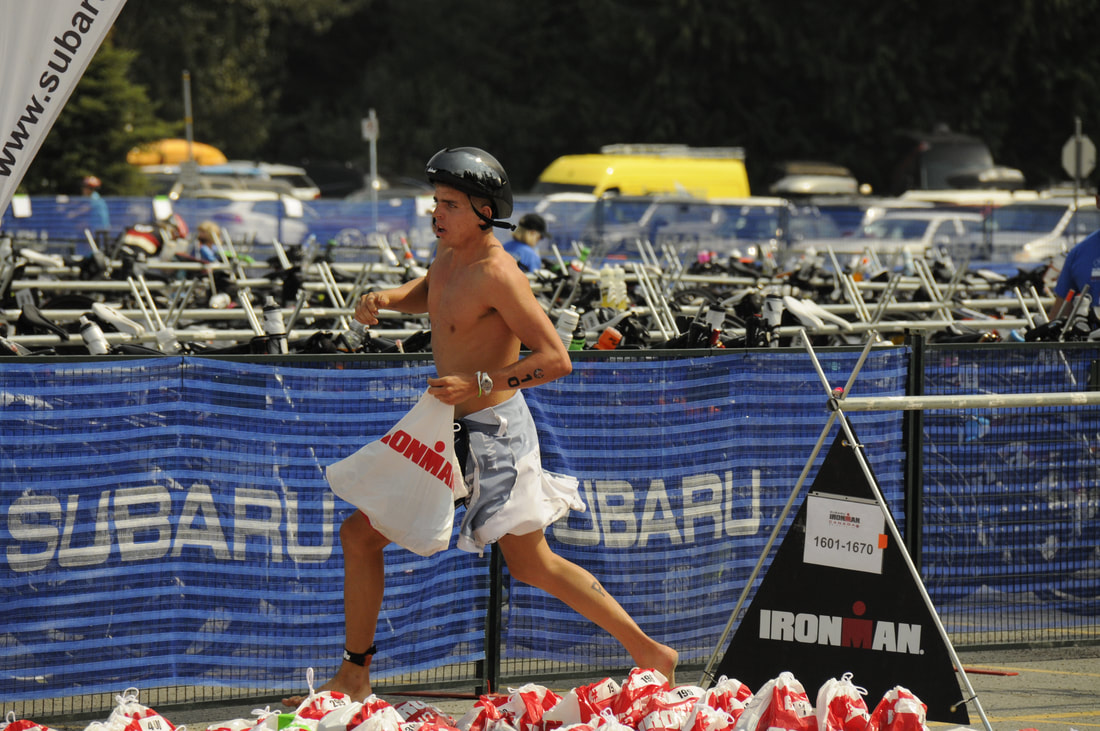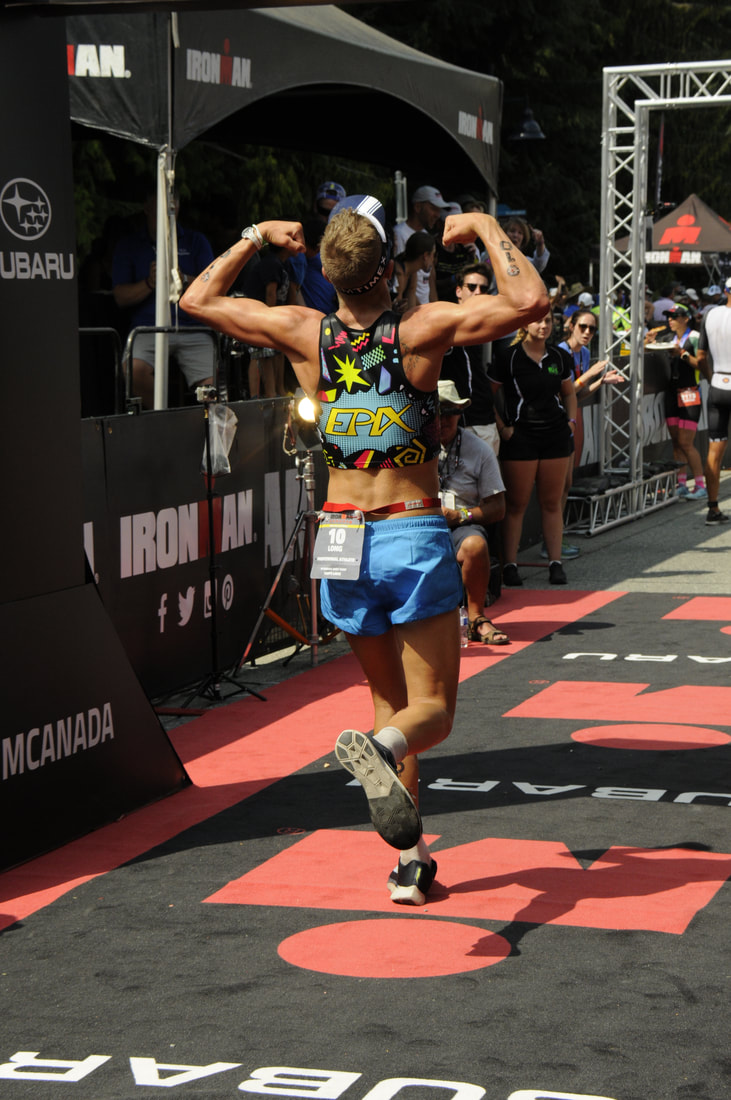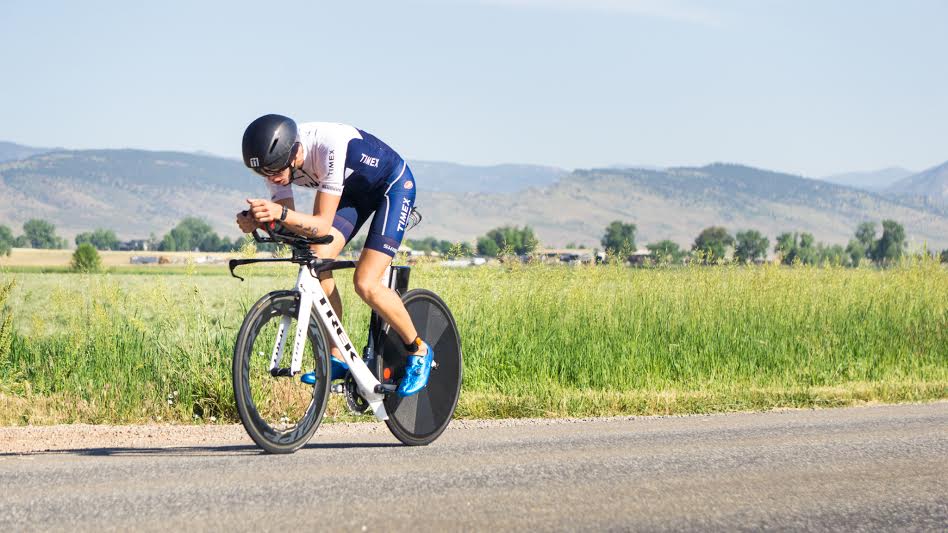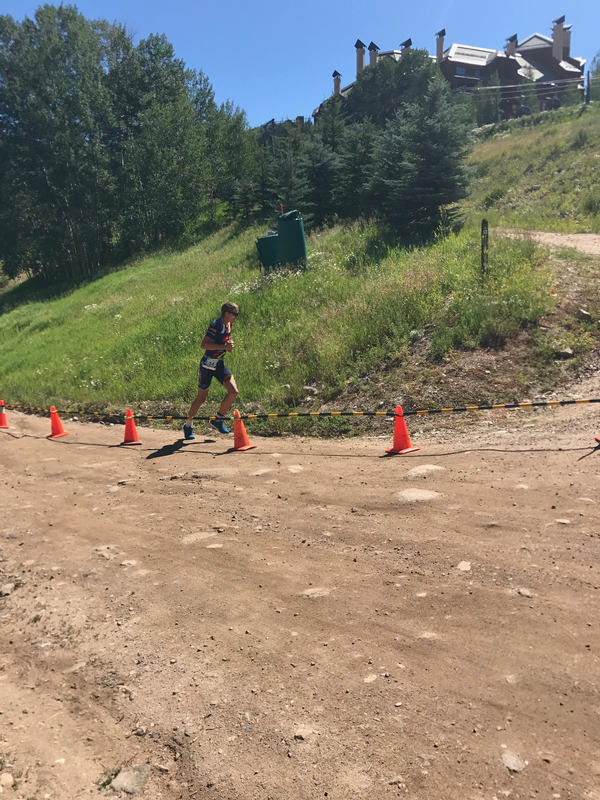|
Hmm, not sure where to start. The first thing I will say is this was a very tough day. The course and the conditions made it so that any weakness anywhere would be exposed. Anyone who was there will know this was true. Congrats to everyone who raced! The short details: Swim: 57:49 (non wetsuit) Bike: 4:44:05 (4th fastest split) Run: 3:02:57 Overall: 4th in 8:48:05 But the devil is in the details! The race really started for me as soon as I crossed the finish line at Beaver Creek 8 days before. I made sure to do my best to recover by warming down and eating properly that day. The week then was mostly rest; however I worked a 11-hour catering job on Sunday, and then had to drive 22 hours up to Canada. I didn't leave till Tuesday because I was unable to pack until Monday. In retrospect these decisions might have cost me the mere 3 minutes to 3rd place. But you live, and you learn.
With this being said I woke up on race day feeling good and stoked to race. I was hungry to push myself in another IM. The morning went the smoothest any of my race mornings have ever gone and I found myself with 10 minutes to do some mediation before the swim started. Once the swim started I found myself in a good group. I felt great on the swim. I felt as if I was hardly working. So, this was good, although a very strange situation for me. The final 1000 got a bit hard but that happens. From here it was onto the bike. Frankly, the bike was miserable. My glutes were shut down from the very first mile. This caused my low back to seize up within 5 miles. I felt as if I wasn’t producing any power. Oh, and my bike computer decided not to work on this morning. So pretty much everything was going wrong. Truthfully, I thought about dropping out the whole first lap. But then I remembered my DNF as Cozumel and realized no matter how much this day would suck (regardless of how I’d finish) not finishing would haunt me and cause much more long term mental suffering and disappointment. So, I found the silver lining and went back to my positive self! I just kept telling myself if the bike sucks this much then the run won’t be as bad. And I just took it minute by minute. I really didn’t make any moves and am surprised I had the 4th fastest split. The nice thing is when you feel like dog shit you are forced to race smart. So I think I raced a very smart bike that allowed me to conserve energy—while usually I am so strong on the bike I may burn too many matches. I rode with groups virtually the entire bike and this helped to at least keep my mind occupied. Finally, the bike came to an end and me and Justin Metlzer came into transition (with Tripp Hipple and Matt Russel just a few minutes behind). I managed to pull a fast one on him and beat him out of T2. Now the real race started. And as I predicted the run felt much better than the bike! It felt so good just to stand tall and use the posterior chain. The beginning of an IM in the pro field is very dynamic. Position matters a lot for the mental edge it can give you. This is why you often see pro races with terribly split marathon times. I knew holding Justin off would be important in this sense. We both were running hard and before I knew it I found myself in 3rd—passed 4 people in 5k. I settled into this and just focused on getting 300+ calories in per hour (a very difficult feat in a marathon in 100-degree temps). And then. I managed the pain. The first 12 miles cruised by but then it was about mind over matter. (I stopped to pee at 12 miles--the first pee in 7 hours, god that felt good!!) Telling my legs to go when I wanted to walk. I didn’t walk. Every aid station the cold water on my head would bring me to reality and I would surge but then in the time in between I would get delusional and start telling myself “I can slow down, I'll still do well, a top ten would be great”. The other competitors would nearly pass me in between aid stations. But then boom, I’d put the cold water on my head and keep going. They probably thought something was wrong with me! Yet I still got passed. By Matt Russel—one of the best athletes in the sport. He passed me with around 2 miles left. That sucked! But I kept going and finished 4th. My best IM result yet. Stoked with my finish on a day that wasn’t my best. But that's the thing about IM; something will always go wrong and you learn that you can deal with it. You learn that you can tolerate pain and that you are stronger than you think. That's why I like to do them--they teach you how to be a better human. That's why I'll be doing IM Mont. Treblant in 3 weeks. Being a professional athlete is often about doing the things that you should do but don’t want to (Resting, not going out, eating very well, etc.). But being 22 is about doing the things you want to do even when you shouldn’t. This is essentially the balancing act of my life right now. In this post I discuss why I have decided to do the races I am and my training since IM Boulder. First my race schedule has been rather intense. Since IM Boulder I have already done 2 races one of which was a 3-day stage race. Both were cycling races. However, the real racing starts this weekend with Xterra Beaver Creek (7/21), then Ironman Whistler the week after (7/29), and Ironman Mont. Tremblant 3 weeks after (8/19). I know virtually everyone will be saying why race so much? I love to race and for me that is the reason of training, and I have done so much training this year that I believe I can perform well at all three races. Isn’t it too much and aren’t you worried about burning out? While burning out is something to be conscious of avoiding, I simply don’t think it will be an issue here. My plan is to race these three races and then to take some time off. Ultimately, I’m doing these three races because I’m stoked about every race. Xterra Beaver Creek is one of my favorite races; high altitude, great mountain bike course, and a hard-hilly run. I love it. IM Whistler excites me because I have never been to that area—I hear it is beautiful. The bike course is very hilly and will reward someone who is strong on the bike and the run has lots of dirt on it. Mont. T. I am doing because it is also in a great area, I get poutine after the race, and I’m going to the race with someone I’m stoked about (Amy!). The thing I have learned about IM racing is that the most important thing is being hungry (to do well, you will always be hungry nutritionally speaking!) and being very excited about the race itself—these two things far outweigh fitness. I have seen people far stronger than me do much worse because they lacked these required elements. So that’s the schedule and life is short so why not do it! After I decided this was gonna be the schedule the question turned to execution. How was I going to complete this task to the best degree possible? To answer this question, I had a nice long chat with Eric Kenney as well as doing some deep thinking on my own. What I realized at IM Boulder is that my fitness level was very high (there are 3 things I will be doing at the next two IM’s completely unrelated to fitness that should allow me to go 10+ minutes faster). I have done a massive amount of training this year. What this means is that the risk—reward relationship gets skewed. Let me explain.
When you are not very fit. The reward of training is massive. You will get more fit almost regardless of what you do. The risk is also relatively low, you are unlikely to get over trained or injured; unless you train too much. The mistake a lot of beginning athletes make is they want to improve too rapidly. They then do too much and instead of just getting steady gains from fitness they get injured. However, when you get very fit and have been putting lots of work in for a long duration the relationship gets inverted. More work will not get you very much reward. And the risk can become somewhat high. This is especially true when you are trying to race multiple IM’s in a short period. Thus, I realized I didn’t need to do the same type of training I did to get ready for IM Boulder (I had 4 weeks of 35 hours or more of training leading into IM Boulder). In fact, what I needed was to make sure I controlled the amount of work I did. This was one of the main reasons I decided to do the Colorado State TT champs and the Boulder Stage Race. They would force me to rest! This is exactly what they did. I rested a little bit going into each race. I raced well at both race--giving me even more confidence on the bike, I got great power data, and it helped raise my top end. All in all, it was a great decision to race these. If I boil it down by week since IM Boulder. Week after: rest and active recovery. Also, some major going out with friends and camoing to get rejuvenated. Doing some training by end of week. Two weeks after: Colorado State TT Champs, and some other very high end work on the bike (two Bustop rides, and a vo2 session). Also, some solid swimming and building back onto running. Three weeks after. Boulder Stage Race from Friday-Sunday. Early in the week saw me doing my first long day since IM Boulder (7+ hours), again more good swimming, and some solid run workouts. Four weeks after: going up to CB. This was a strength base phase. I ran and road a lot of hills. Had lots of longer days to work on my metabolic efficiency and get mentally prepared for an IM. Not much swimming was done. Finally, working on the MTB skills to do well at Beaver Creek. Five weeks after (the week we just finished): This was the peak week of training. The first half was done at CB and included my most important IM session; a 7 hour ride with efforts, and a 10 mile run with efforts, with a second recovery ride in the evening. Then the end of the week included key swims, runs and another long ride. That’s it! That is the entire training block going into these races. I started my taper today. (one day early in fact, I had a long run planned but decided it was too high risk). The next week will see me doing some higher end work to stay tuned for Beaver Creek and then the week after will be very minimal going into Whistler. I can’t be more excited going into this racing block. If I’m honest part of me was very worried about losing fitness since IM Boulder. However, after these past two weeks of training I am hitting better numbers than I ever had and my body is holding up extraordinarily well. It took courage to commit to the plan I wrote out and its looking like it will pay out. I know the final question people will have is Kona…And my answer is I am not doing this for Kona, I am doing it for each and every race as its self and because I believe it will make me a stronger athlete in the months and years to come. I will very likely qualify with two more IM’s—however my plan is to skip Kona. I see that being more of a long-term goal (that doesn’t mean I wont necessarily go!) Thanks for reading. I apologize for this being a bit dense but please let me know your thoughts and if you have any questions. Cheers, Sam |
|





 RSS Feed
RSS Feed